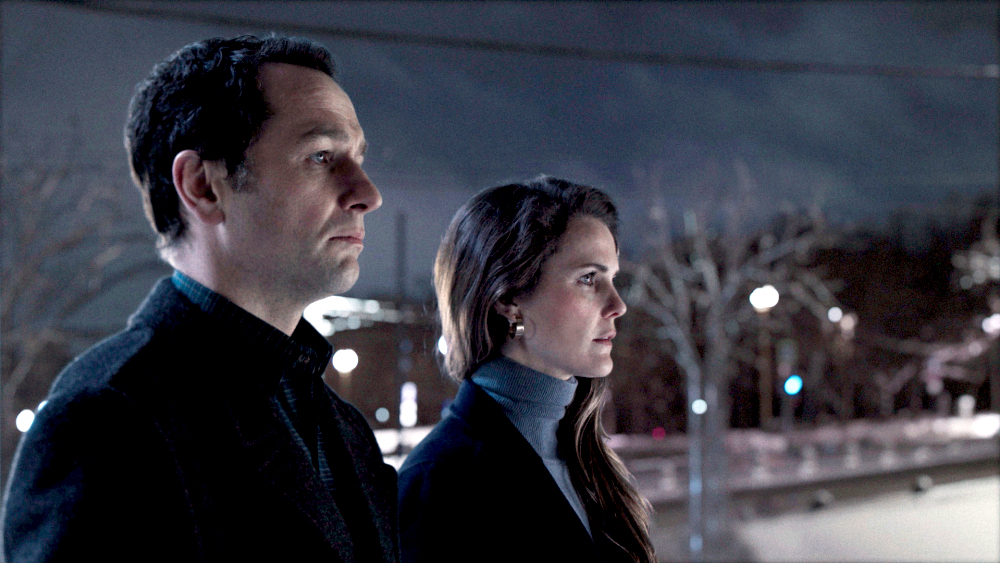by Lynn Lee
[Warning: Spoilers for the series finale of The Americans]

It ended not with a bang or with a whimper, but with the characteristic slow burn and emotional gravitas that’s been its hallmark all along. The series finale of The Americans may not have been what everyone expected or wanted, but it was a fitting conclusion to one of the best shows of the decade.
There’s been plenty of speculation over the years about the end game for FX’s critically acclaimed but ratings-challenged drama about Reagan-era Soviet spies posing as the perfectly all-American family next door. History foreordained that the Jenningses’ cause was doomed, and as their personal kill count and internal conflict mounted, a reckoning seemed inevitable...
But what form would it take? Would one or more of them die? Be hauled off to prison? Return to mother Russia?
 As it turns out, none of them died, our two leads did get back to their native country after doing Gorbachev a solid, and the only Soviet spy who went to prison wasn’t a Jennings. (Ladies and gentlemen, a tear for Oleg Burov, played by Costa Ronin - the one character who consistently transcended national and ideological divisions to do the right thing.) In some ways the episode felt almost anticlimactic in its restraint: no hail of gunfire, no convoluted plot twists, and no melodramatic farewells, unless you count one emotionally lopsided phone call; the biggest gut punch was the sight of a girl getting off a train. The final scenes had a muted, elegiac tone, despite marking a new beginning for Philip (Matthew Rhys) and Elizabeth (Keri Russell) – perhaps because even back “home,” we know history is still not on their side, and because they left so much of themselves back in the States. Yet there’s a bittersweet tenderness about the two of them facing their uncertain future together that embodied what made the show work so well.
As it turns out, none of them died, our two leads did get back to their native country after doing Gorbachev a solid, and the only Soviet spy who went to prison wasn’t a Jennings. (Ladies and gentlemen, a tear for Oleg Burov, played by Costa Ronin - the one character who consistently transcended national and ideological divisions to do the right thing.) In some ways the episode felt almost anticlimactic in its restraint: no hail of gunfire, no convoluted plot twists, and no melodramatic farewells, unless you count one emotionally lopsided phone call; the biggest gut punch was the sight of a girl getting off a train. The final scenes had a muted, elegiac tone, despite marking a new beginning for Philip (Matthew Rhys) and Elizabeth (Keri Russell) – perhaps because even back “home,” we know history is still not on their side, and because they left so much of themselves back in the States. Yet there’s a bittersweet tenderness about the two of them facing their uncertain future together that embodied what made the show work so well.
For The Americans, despite its trappings as a spy thriller, was always at its core a love story and a domestic family drama. Yes, it provided a fascinating take on the geopolitics of the tail end of the Cold War, and it could and did out-le Carré le Carré with its white-knuckle old-school cloak and dagger sequences and its constant questioning of whether all this espionage really had any larger meaning or value. But the personal is also political, and the finale’s most heart-wrenching moments confirmed how inextricable the characters’ relationships were from the national and global currents that enveloped them.
There was the long-awaited if too-brief confrontation between the Jenningses and their FBI agent neighbor, Stan Beeman (Noah Emmerich), in which the latter framed their guilt less as an attack on his country and more as a personal betrayal, but ultimately let them go for personal reasons also. There was that anguished yet awkward phone call that underscored Henry Jennings’ isolation – which ironically might also be his salvation – from the rest of his family, book-ended with our final view of the boy, shoulders slumped, learning the truth from Stan. There was that cut from Paige on the station platform to her parents on the train, Elizabeth’s normally stoic face crumpling into intense shock and grief as she realizes she’s lost her daughter. (That moment also illustrates why Keri Russell deserves all the Emmys – as does Rhys, and Emmerich, and just about everyone on the show.) And finally, there was the transition from Elizabeth’s unsettling dream about the road not taken – the life and love she might have had – to traveling the road back to Moscow with the partner she may not have chosen originally, but did choose to stay with, for better or worse.

Some may feel like Philip and Elizabeth got off easy, or at least easier than they deserved, considering the many, many innocent victims they brutally murdered or whose lives they otherwise ruined. Yet from another perspective, there’s a certain poetic justice to their fate. The cause they gave up everything for has become muddled by treachery and is about to collapse. The country they’re returning to is not the one they knew, and one where their political footing is precarious at best. The family and friendships they built over the last twenty years have been torn apart. All they have now is each other – and perhaps that’s all they need. It’s a testament to how compelling their bond is that despite everything, we’re still rooting for this couple to make it. That may well be the most enduring legacy of The Americans, and it’s a worthy one.